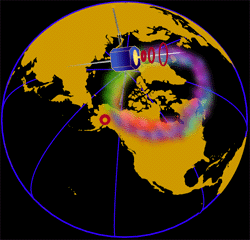
- The UC Berkeley Science Operation Center (the SOC) recieves raw
data from FAST about every orbit it completes around the Earth.
- On board the spacecraft, solid state memory is used to collect
the data which is then transmitted to ground stations such as the one in Poker Flat, Alaska. Solid state memory
is ideal for the mission because it does not rely on moving parts such as disks or tapes which can fail in harsh
conditions; solid state memory can transfer large blocks of information (such as FAST's data "snapshots")
quickly and reliably. FAST's "smart"
onboard processors automatically turn on when auroral phenomena are encountered.
- NASA recieves the raw data at Wallops Island, Virginia within a
few hours of its transmission to the ground where it is packaged and sent for storage and archiving at the Space
Sciences Lab in Berkeley. The illustration (right) shows the path of the FAST information flow from: 1) the spacecraft
to 2) Poker Flat, Alaska, to 3)Wallops Island & GSFC and finally 4) the SOC in Berkeley.
|